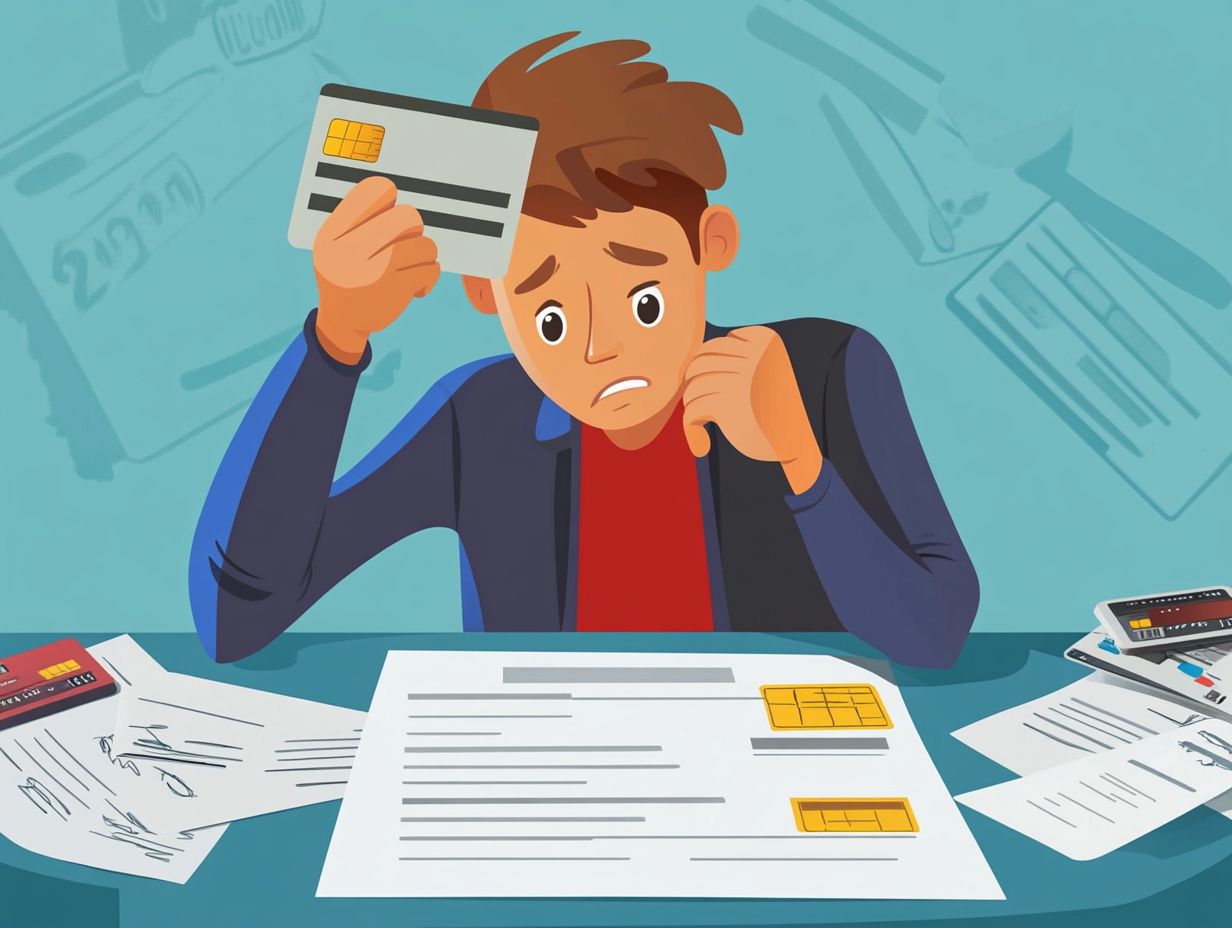5 Warning Signs of a Bad Credit Card Application
Choosing the right credit card can feel overwhelming. There are so many options available!
It’s crucial to identify the warning signs of a bad credit card application. High interest rates and hidden fees can become costly surprises, leading to unnecessary frustration.
This article outlines five key red flags to watch for, paired with strategies to help you sidestep poor choices and enhance your chances of approval.
Ready to take charge of your credit card journey? Let s dive in!
Contents
- Key Takeaways:
- 1. High Interest Rates
- 2. Hidden Fees and Charges
- 3. Limited or No Rewards Program
- 4. Poor Customer Service and Support
- 5. Difficult Approval Process
- What Are the Key Factors to Consider When Applying for a Credit Card?
- How Can One Avoid Falling for a Bad Credit Card?
- What Are the Benefits of Researching Before Applying for a Credit Card?
- What Are the Most Common Red Flags to Look Out for in Credit Card Applications?
- How Can One Improve Their Chances of Getting Approved for a Credit Card?
- What Are the Alternatives to Traditional Credit Cards?
- Frequently Asked Questions
- What are the 5 warning signs of a bad credit card application?
- Why is a low credit limit a red flag in a credit card application?
- What should I look out for in interest rates when applying for a credit card?
- How can hidden fees affect my credit card application?
- What are unfavorable terms and conditions in a credit card application?
- What should I do if my credit card application gets rejected or denied?
Key Takeaways:

- Avoid high interest rates! They can trap you in a cycle of debt.
- Hidden fees and charges can significantly increase the cost of using a credit card. Always read the fine print before applying.
- A credit card with limited or no rewards program may not be worth your while. Look for cards that offer rewards aligned with your spending habits.
1. High Interest Rates
High interest rates on credit cards can profoundly affect your financial landscape. It’s essential to grasp how APR, which stands for Annual Percentage Rate, influences your total debt repayment and credit score over time, especially if late payments become a recurring issue.
When managing a revolving balance, slipping into a cycle of increasing costs over time due to accruing interest is all too easy. This can magnify your monthly payment obligations and negatively impact your credit rating, leading to money troubles.
You can tackle these challenges by implementing strategies like:
- Consolidating your debt
- Negotiating with lenders for lower rates
- Taking advantage of balance transfer offers
By consistently paying more than the minimum due, you can chip away at the principal owed and mitigate the impact of high-interest rates.
2. Hidden Fees and Charges
Understanding the hidden fees and charges associated with credit cards is crucial for maintaining your financial wellness. These costs can accumulate rapidly and disrupt your budget planning efforts.
Many might overlook that annual fees, late payment charges, and foreign transaction fees can significantly alter their overall spending habits. For instance, missing a payment deadline could lead to costly penalties that increase your debt burden and negatively affect your credit score. If you travel frequently, those foreign transaction fees often a percentage of each purchase abroad can catch you off guard.
To navigate these challenges effectively, conduct thorough financial assessments, such as:
- Reviewing card terms before applying
- Setting up automatic payments
- Considering no-annual-fee cards when feasible
Implementing these strategies can help you minimize potential pitfalls and keep your finances on track.
3. Limited or No Rewards Program
A credit card with limited or no rewards program could hinder your ability to seize financial opportunities. Rewards can offer substantial benefits when utilized wisely.
Opting for cards with robust rewards programs unlocks a treasure trove of incentives, from cash back and travel points to exclusive discounts on your everyday purchases. This strategic approach to spending transforms routine expenses into rewarding experiences and fosters thoughtful financial habits.
By aligning your reward offerings with your personal spending patterns, you can turn ordinary purchases into savings and benefits, enhancing your overall financial landscape. With smart choices, you can turn everyday purchases into exciting rewards! Start crafting your rewarding financial journey today!
4. Poor Customer Service and Support

Poor customer service and support from credit card issuers can lead to frustration and confusion, especially when you’re trying to understand payment choices or seek financial counseling for debt-related issues.
This unreliable support can amplify your existing financial challenges, making it more difficult to manage your credit effectively. You may encounter common concerns like confusing bills, limited payment options, and a lack of guidance when exploring debt relief solutions. It s understandable to feel overwhelmed by these obstacles, especially in an already stressful situation.
To address these issues, it’s essential to seek out reliable financial counseling services, whether online or through local community organizations. These resources can provide tailored, comprehensive advice that empower you to take control of your credit card accounts and make informed financial decisions.
5. Difficult Approval Process
Navigating the credit card approval process can feel like an uphill battle, especially if you have a poor credit history or high balances. These factors significantly impact your loan applications and credit inquiries.
Understanding the complexities of credit scoring and utilization rates is essential for determining your eligibility. Lenders closely examine credit reports for any delinquencies or defaults, which can flag you as a higher risk. Maintaining high credit card balances relative to your limits can negatively impact your credit utilization ratios, making it more challenging to secure approvals.
You can enhance your chances by adopting proactive credit management strategies like consistently making payments on time, reducing existing debts, and regularly monitoring your credit reports you can greatly improve your chances of obtaining credit cards in the future.
What Are the Key Factors to Consider When Applying for a Credit Card?
When you apply for a credit card, be sure to think about key factors like your credit score, desired credit limits, and overall financial decisions. This ensures that you select the best card tailored to your budget planning and spending habits.
As a prospective cardholder, pay close attention to interest rates and any associated fees; these can significantly impact the overall cost of using the card. Rewards programs can offer fantastic benefits, but aligning them with your spending patterns is essential to maximize potential gains.
Understanding how these factors interact will empower you to avoid common pitfalls and make informed choices that advance your financial goals. You re not just getting a card; you re making an investment in a powerful tool that can streamline your financial journey.
How Can One Avoid Falling for a Bad Credit Card?
To steer clear of a bad credit card, act quickly to assess your financial wellness, recognize your spending triggers, and conduct thorough research to avoid cards with unfavorable terms.
This means taking a close look at interest rates and understanding how they influence your monthly payments. You should also be on the lookout for any hidden fees that could accumulate over time. Evaluating the rewards programs offered by various cards is equally important, as these can yield significant benefits if they align with your spending habits.
By understanding your own financial behaviors, you can dodge costly pitfalls; for example, if you tend to carry a balance, opting for a card with a lower interest rate would serve you well. With diligence and knowledge at your side, you can make a more informed financial choice.
What Are the Benefits of Researching Before Applying for a Credit Card?

Before you apply for a credit card, research to unlock your financial potential! Researching before applying offers you a wealth of benefits, giving you the power to make informed financial decisions and uncover credit opportunities that align perfectly with your spending habits and financial aspirations.
By comparing interest rates, fees, and rewards programs, you gain a clearer understanding of the overall costs and potential benefits associated with various credit options. This meticulous evaluation allows you to steer clear of high-interest debts and pinpoint cards that provide valuable rewards tailored to your specific purchases, whether that s travel or groceries.
A thorough investigation helps you select a card that maximizes immediate perks. It also positions you for long-term financial wellness by encouraging responsible credit usage and minimizing unnecessary expenses. Ultimately, making a well-informed choice can lead to significant savings and enhanced financial flexibility in your future.
What Are the Most Common Red Flags to Look Out for in Credit Card Applications?
Identifying common red flags in credit card applications is essential for safeguarding yourself against unfavorable financial repercussions and damaging credit reporting. To enhance your chances of approval, consider how to improve your credit card application success by looking out for vague terms, excessive fees, and high-interest rates.
Be especially wary of promotional offers that appear too good to be true; these often conceal conditions that may not be advantageous in the long run. Careful checking of the fine print may reveal sudden increases in interest rates after an introductory period or penalties for late payments that can escalate alarmingly fast.
Act fast! Assess the trustworthiness of the card issuer now to avoid future pitfalls. Take the time to research reviews and ratings available online to get a sense of their reputation. By staying vigilant and informed, you can navigate the credit landscape more effectively, ensuring that any agreement you enter into is both beneficial and transparent.
How Can One Improve Their Chances of Getting Approved for a Credit Card?
Improving your chances of getting approved for a credit card hinges on a clear understanding of your credit history, effectively managing credit utilization (the amount of credit you are using compared to your total available credit), and regularly assessing your financial situation to maintain a favorable credit profile.
To begin, checking your credit score is crucial; it offers valuable insights into areas that may require improvement. Next, consider paying down any existing debts, as this can significantly enhance your overall creditworthiness.
Prioritizing timely payments on current obligations is essential, as it demonstrates reliability to potential lenders. By maintaining a strong credit history, you greatly increase your approval odds, showcasing your ability to manage credit responsibly.
Additionally, minimizing new credit inquiries and keeping older accounts active contribute to a robust credit profile that reflects a solid financial track record one that institutions truly admire.
What Are the Alternatives to Traditional Credit Cards?
Alternatives to traditional credit cards, like secured credit cards and personal loans, present valuable opportunities for you to manage your finances effectively while enhancing your budgeting skills and credit scores.
These alternatives come with their own unique advantages and disadvantages that deserve your careful consideration. For instance, secured credit cards can help you establish or rebuild your credit history with relatively low risk since they require a cash deposit as collateral. However, the initial upfront cost might give you pause.
On the flip side, personal loans offer you flexibility in borrowing and can be utilized for a variety of purposes, from debt consolidation to covering unexpected expenses. Just keep in mind that they can come with interest rates that fluctuate significantly.
While cash advances can provide immediate cash flow in emergencies, they often carry high fees and interest rates, making them less than ideal for long-term financial health.
By weighing these options, you can navigate your financial landscape more effectively, fostering mindful credit usage and enhancing your awareness of credit management.
Frequently Asked Questions

What are the 5 warning signs of a bad credit card application?
Watch out for these five warning signs: a low credit limit, high interest rates, hidden fees, unfavorable terms, and application rejection.
Why is a low credit limit a red flag in a credit card application?
A low credit limit suggests that the credit card company sees you as a high-risk borrower. This can make it hard to use the card for big purchases or build your credit.
What should I look out for in interest rates when applying for a credit card?
Be cautious of high interest rates. They can add up quickly and make it tough to pay off your balance.
Hidden fees, like annual fees or penalty charges, can make using a credit card more expensive. They might also show that the credit card company prioritizes profit over customer service.
What are unfavorable terms and conditions in a credit card application?
Unfavorable terms can include high fees, strict payment deadlines, and limited rewards. Such conditions make using the card costly and often lack transparency from the issuer.
What should I do if my credit card application gets rejected or denied?
If your application is denied, find out the reason. Request a free credit report to check for errors or negative marks that might have affected your application.






